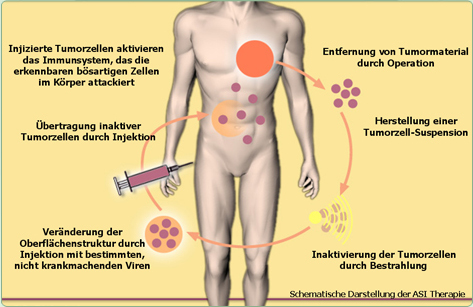|
ASI-Therapy

Cancer patients oftentimes display an intact immune system equipped with special forces, trained to recognize foreign cells as intruders and ready to eliminate them. To delude the immune system, cancer cells frequently try to disguise themselves in a very sophisticated manner in order to match healthy body cells. Through this strategy, they can often grow unnoticed to a tumor undetected by the immune cells as foreign. Many relapses can be explained that way. According to scientific research, relapses are more likely to happen if the immune system is suppressed additionally. This is where the ASI-Therapy or Tumor Vaccination comes in. This tumor vaccine shall demonstrate essential cancer cell detection signals to the body's immune system and shall train it accordingly to recognize those cancer cells as foreign. The storage of tumor tissue during surgery is required for tumor growth in specialized laboratories. Therefore, special precautions are taken prior to surgery. If the Pathologist receives the tumor tissue after the surgery for histological diagnosis, it will be fixed in formalin. Thus, it will no longer be usable for ASI-therapy.
Therefore, it is important that every patient with a cancer diagnosis who qualifies for cancer surgery, gets enough time to acquire information about different therapy possibilities and, where applicalbe, seek a second or third opinion.
We already know, that with the tumour vaccine the relapse frequency e.g. for colorectal cancer in stage Il or lll is lowered by 50%.
What is the process of tumor vaccine manufacturing and subsequent vaccination? During surgery, native (i.e. unaltered) tissue, must be obtained for tumor vaccination. Depending on the laboratory, the tumor tissue will be sent out fresh or frozen.
I would like to shortly describe the two major manufacturing processes:
1. According to Avrameas/Pasteur institute Paris and Tallberg Helsinki, the so-called Polymerisation process
freezes the tumour tissue, reduces it to small pieces and emphasizes the essential defining features of the surface structure of the cancer cells with the help of additives.
After completion of the initial treatment and examination of the immune system for functionality, the tumor vaccine is initially injected subcutaneously at 4-week intervals, later at intervals of up to half a year apart.
According to the Schirrmacher procedure, the non-frozen tumor material
is reduced to small pieces and inactivated through radiation. Afterwards, New Castle Desease Viruses are added,
a non-pathogen virus for humans.
These Viruses enhance foreign body identification. After completion of the initial treatment, the vaccine will be enriched with immune stimulators like messenger substances and injected in 4-week-intervals over the course of a longer period.
Prior to tumor vaccination, it is important that the immune system of the cancer patient is active or newly activated through various therapy possibilities, like thymus extracts. This is verified through specific laboratory tests.
In principle, tumor vaccination can be used for all solid tumors.
Even if the back-formation of tumors in metastasized melanoma, ovarial and kidney cancer is observed by Tallberg, tumor vaccination serves primarily as prevention of new metastases.
At the German Cancer Congress in Berlin 2010 it was stressed that vaccinations of tumor tissue could prevent the development of metastases and therefore significantly improve the survival rates for different types of cancers.
3 colorectal cancer studies prove the decrease of colorectal cancer relapse frequency by well over 50 %
.
(eventually insert the 3 studies.)
The ASI-therapy can also lower significantly the relapse frequency of possible operable liver-and lung metastases as part of the primary "colorectal cancer" tumor. In a 10-year study, Schirrmacher could lower the relapse frequency by 50% for operable
liver tumors as part of primary "colorectal cancer" tumors.
(eventually own liver- and lung metastases publication)
At the annual American Society of Clinical Oncology (ASCO) conference in 2009
It was stressed that cancer disease therapies will be influcenced the most by immune therapies in the future
(Prof. Schilsky, Chicago).
Picture from "Deutsches Ärzteblatt" A so-called prospective randomized stage-III study was introduced there, in which advanced skin cancer patients lived longer through an active tumor-specific vaccination.
Prof. Wölfel comments in "Deutsches Ärzteblatt", volume 106, edition 48, 2009
page 2407 "After knowing that the immune system can recognize most of the tumour antigens, the scientific challenge lies in conquering the mechanisms of the tumors with which they escape the immune system", namely the more advanced a cancer disease is, the more escape routes a tumor has already developped. In the last decades, the ASI-therapy or tumor vaccination showed that it can effectively prevent relapses.Future studies and further improvements in identifying the tumor and optimizing its specific defense functions will be a challenge for the future.
| |



